Managing contracts with outdated methods leads to delays, errors, and unnecessary risks. A missed deadline or an overlooked clause can mean lost revenue, legal trouble, or a deal slipping away.
A contract lifecycle management (CLM) platform helps businesses automate contract creation, approvals, tracking, and compliance, keeping everything organized in one system.
No more chasing signatures or searching through folders; contract management software keeps contracts moving and makes sure nothing falls through the cracks.
Businesses of all sizes benefit from faster workflows, better compliance, and reduced manual work when using the right CLM tool.
In this guide, we'll highlight the leading contract management solutions so you can choose the right one for you.
Contract lifecycle management software helps businesses create, store, track, and manage contracts in a structured and automated way.
Instead of juggling spreadsheets, PDFs, and email approvals, you get a centralized system that keeps everything in check. With the right CLM tool, you can:
Whether it's vendor agreements, employment contracts, or internal policies, a CLM system helps your legal and business teams stay organized and in control.
With artificial intelligence and automation, modern CLM tools eliminate the manual work involved in drafting, reviewing, and signing contracts.
Whether you're scaling a startup or optimizing legal operations in a large company, choosing the best contract management software can save time, reduce risks, and keep contracts secure.
Below are some of the best CLM platforms businesses and law firms are using today.
Aline is an AI-powered contract lifecycle management platform built to help businesses draft, negotiate, analyze, and sign contracts up to 10X faster.
It cuts out the need for multiple tools like Word and DocuSign by bringing everything into one organized system.
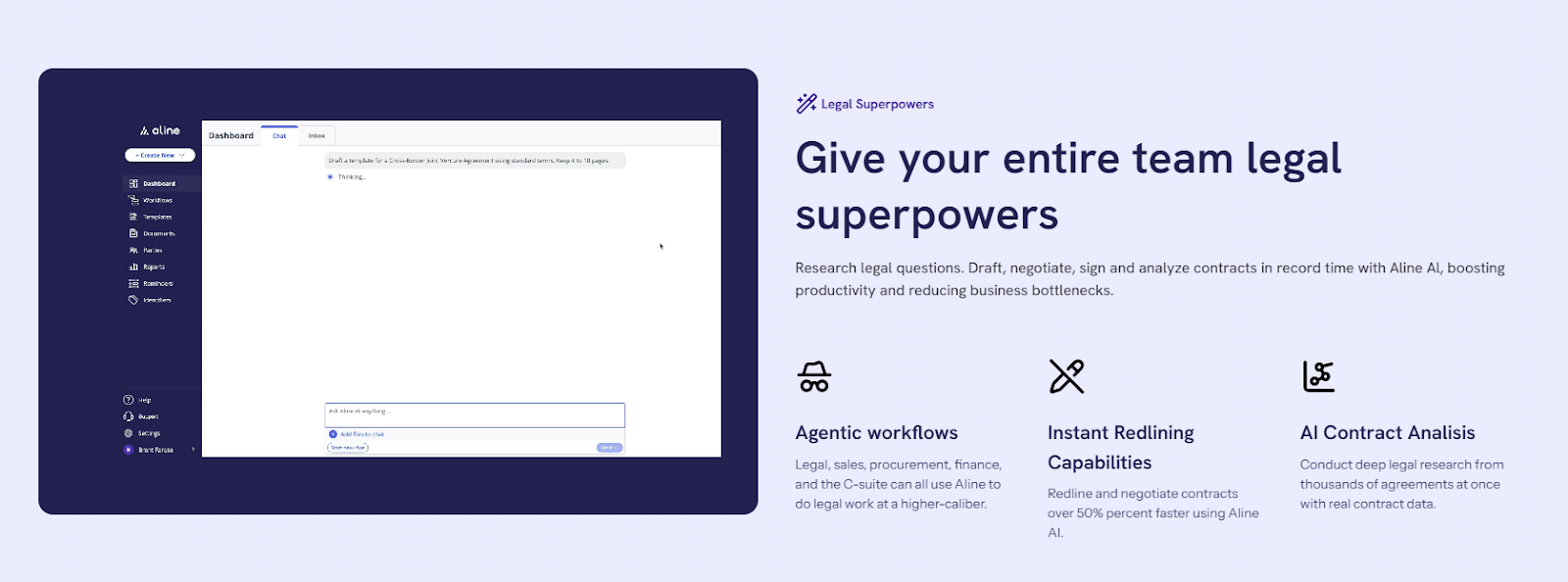
Aline is designed for startups, legal teams, and B2B companies that want to automate contract workflows, reduce manual errors, and speed up deal closures.
With AI-assisted drafting, smart approvals, and built-in e-signatures, Aline makes managing contracts faster and less frustrating.
Businesses that want to automate contract creation, approvals, and compliance in one system while improving real business outcomes.
Aline is a strong fit for startups, B2B companies, and in-house legal teams focused on increasing contract speed and bringing structure to intelligent contract management.
It supports the entire business, not just legal, by helping sales, operations, and finance move agreements forward with clearer visibility and fewer delays.
Interested in a full tour? Start your Aline trial today!
Icertis is a contract lifecycle management platform designed for large enterprises that need strong compliance, risk management, and automation features. It helps businesses draft, approve, and track contracts at scale while ensuring legal and regulatory compliance.

With a focus on AI-powered contract intelligence, Icertis contract management helps companies analyze contracts, effectively manage contract obligations, and reduce risks.
Large enterprises that manage complex contracts, operate in multiple regions, already have existing systems, or need strong compliance and risk management tools.
DocuSign CLM builds on DocuSign’s e-signature technology to offer a full contract lifecycle management solution. It helps businesses automate contract creation, approvals, and compliance tracking to make it easier to manage agreements at scale.
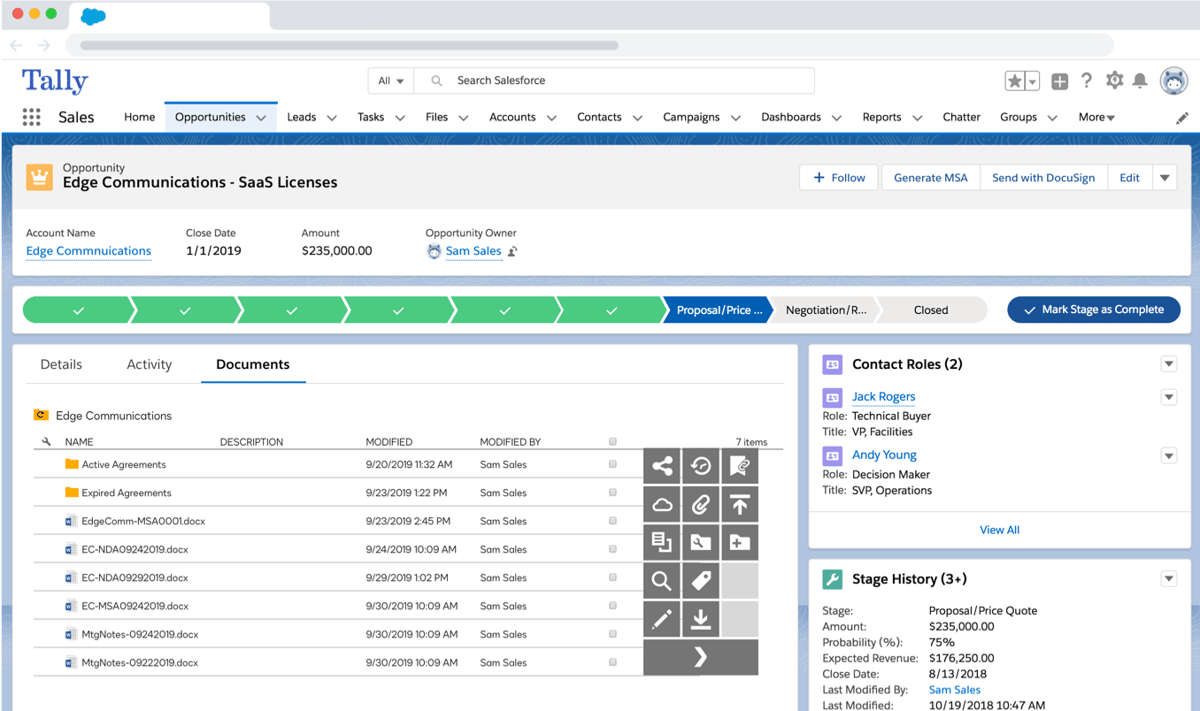
For companies already using DocuSign for e-signatures, this CLM platform is a natural next step.
Businesses that already use DocuSign for e-signatures and want a fully integrated contract management system with automation and compliance tracking.
Juro is a contract lifecycle management platform built for fast-moving businesses that need a simple, intuitive, and automated way to manage contracts efficiently.
Designed for legal, sales, and HR teams, Juro focuses on speeding up contract creation, approvals, and e-signatures without relying on multiple tools.
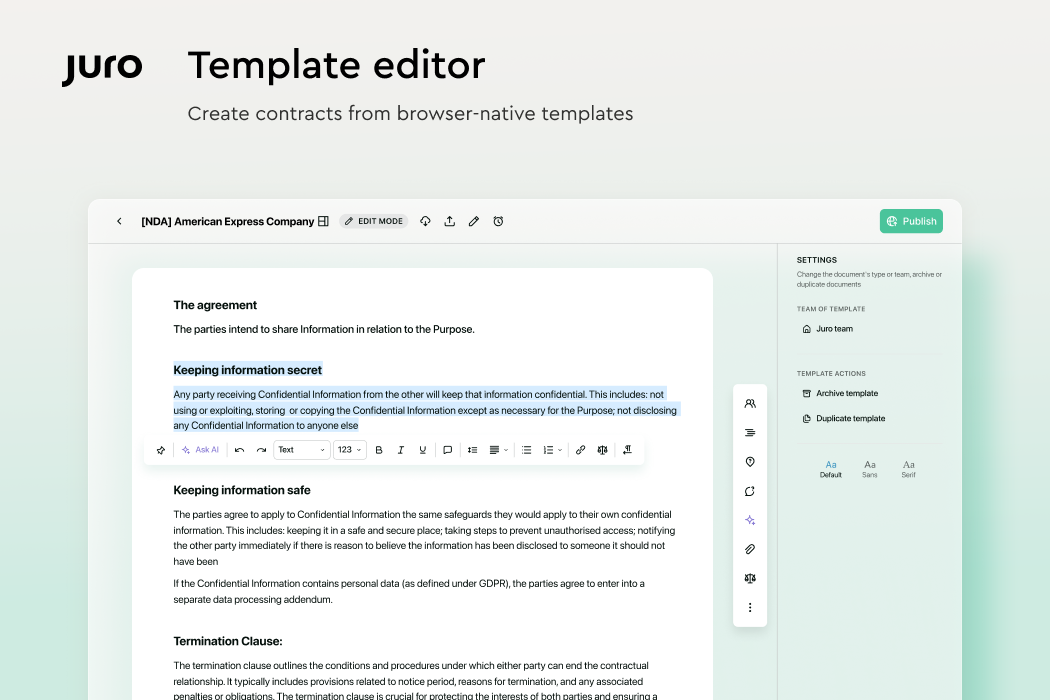
With its browser-based editor, no-code automation, and AI-powered insights, Juro helps teams draft, review, sign, and manage contracts all in one place. By providing centralized storage and contract tools, there's no need to switch between Word, email, or PDF files.
Startups, scale-ups, and mid-sized businesses that need a fast, no-fuss contract management solution with built-in e-signatures and automation.
PandaDoc is a contract lifecycle management system designed for sales teams, HR, and businesses that need an easy way to create, send, and sign contracts.
It’s known for its document automation features, making it a good choice for legal departments that frequently handle proposals, quotes, and contracts.
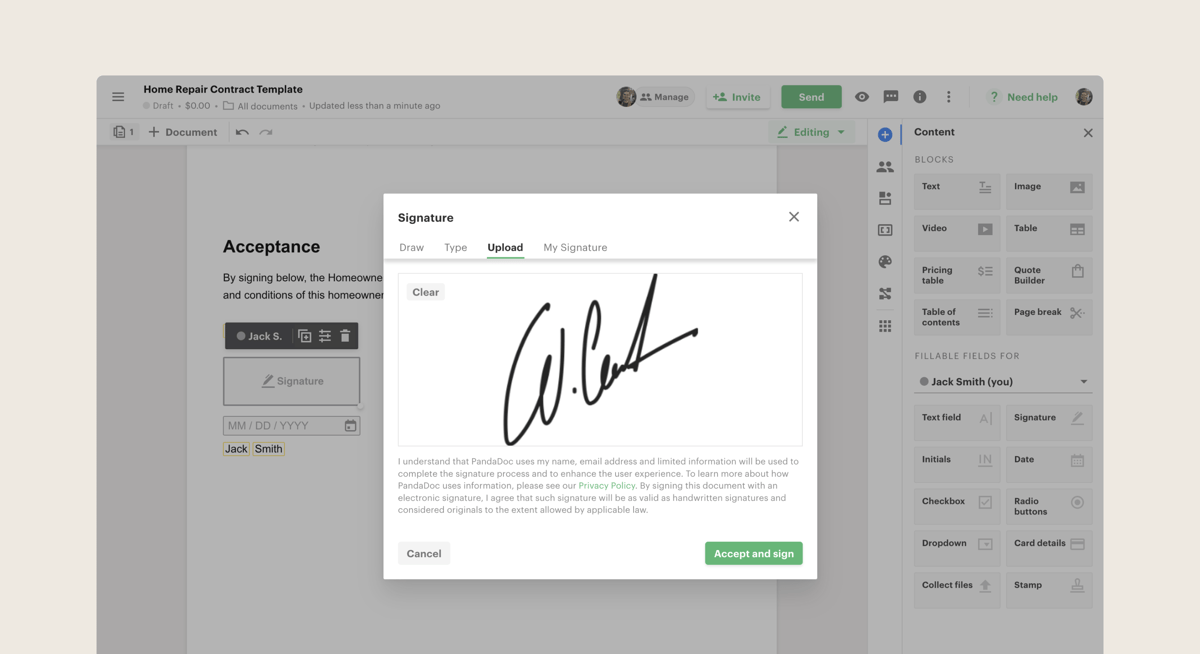
Sales, HR, and business teams that frequently send proposals, contracts, and complex agreements need a simple, automated solution with built-in e-signatures.
DealHub is a contract lifecycle management platform suitable for sales teams that need an all-in-one solution for contract automation, pricing, and deal tracking.
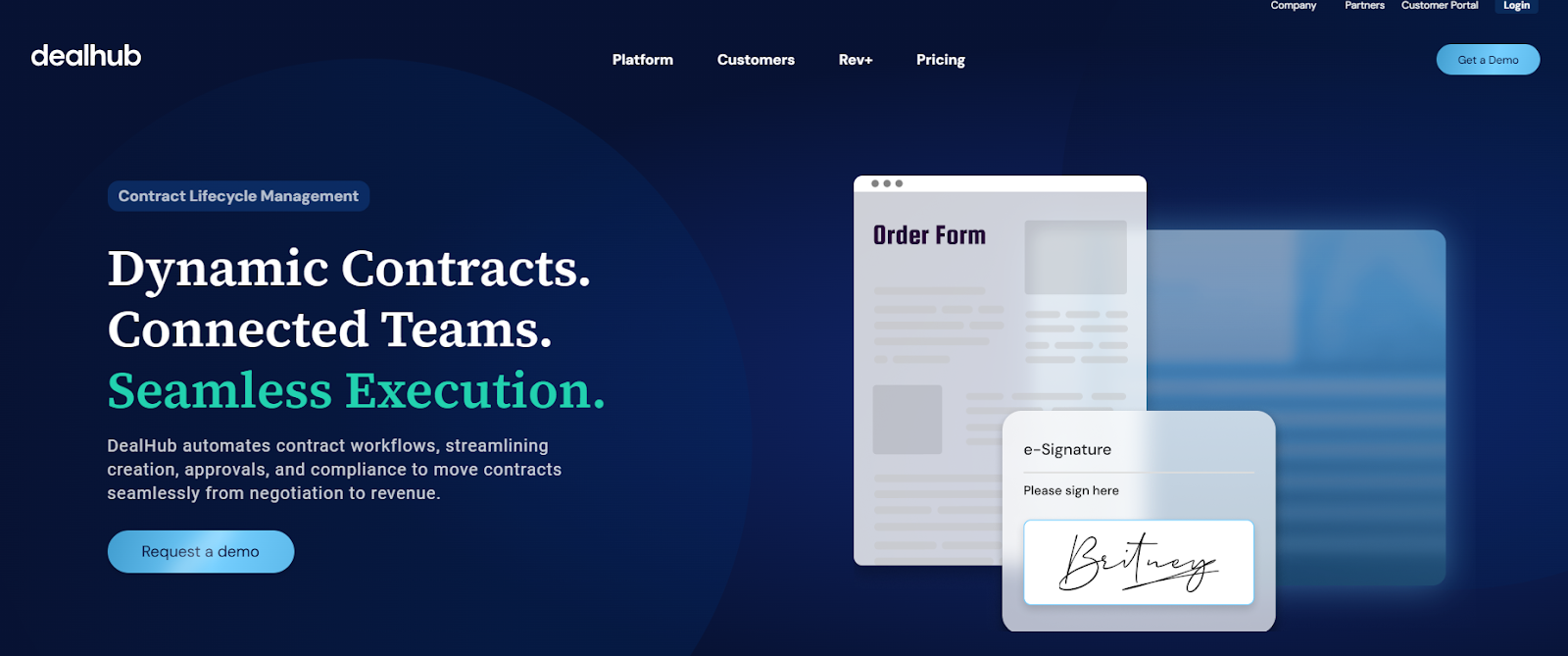
Unlike traditional CLM tools, DealHub integrates contract management with Configure, Price, Quote (CPQ) software. These integrations make it suitable for businesses looking to streamline processes from proposal to closing.
Sales teams and revenue operations teams need a seamless contract management solution integrated with CPQ and CRM tools.
Cobblestone is another contract lifecycle management platform built for businesses, government agencies, and enterprises that need a highly secure and customizable contract management solution.
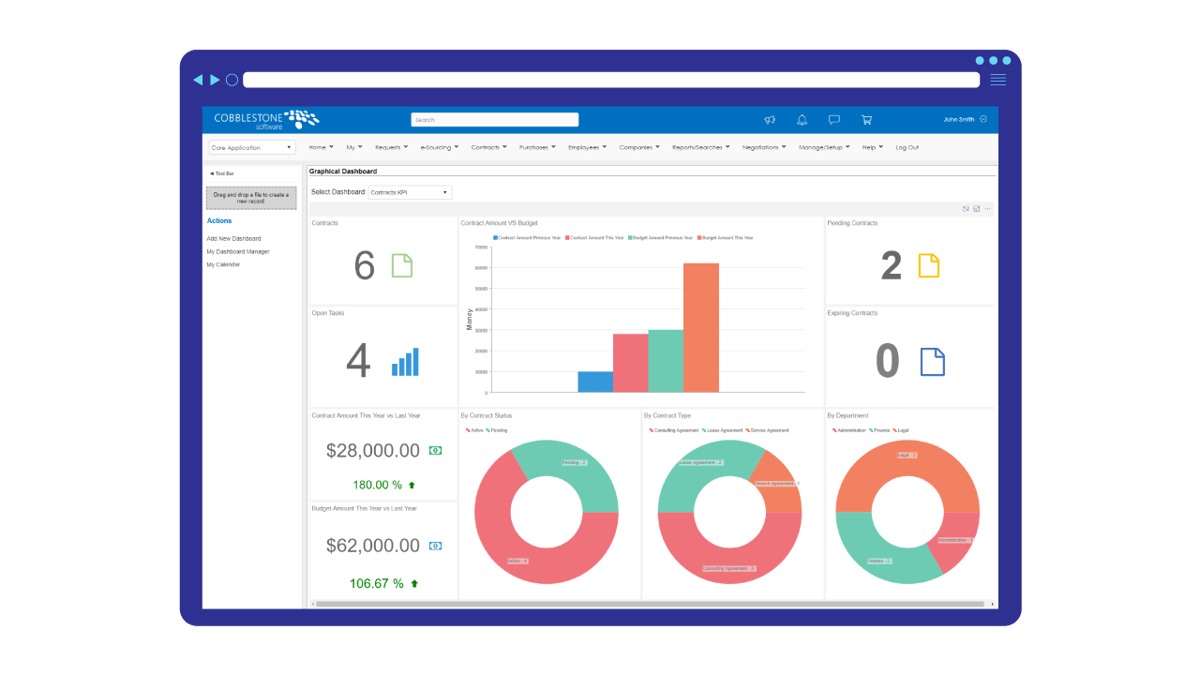
It offers strong compliance tracking, contract automation, and advanced analytics, which make it a good fit for organizations handling high contract volumes and strict regulatory requirements.
With AI-powered contract analysis, automated workflows, and a centralized contract repository, Cobblestone helps businesses organize, track, and manage contracts more efficiently.
Enterprises, government agencies, and organizations that need a secure, AI-powered CLM platform with strong compliance and reporting features.
Conga is a hybrid contract lifecycle management tool designed for businesses that need a flexible, scalable solution for contract automation, approvals, and compliance tracking.
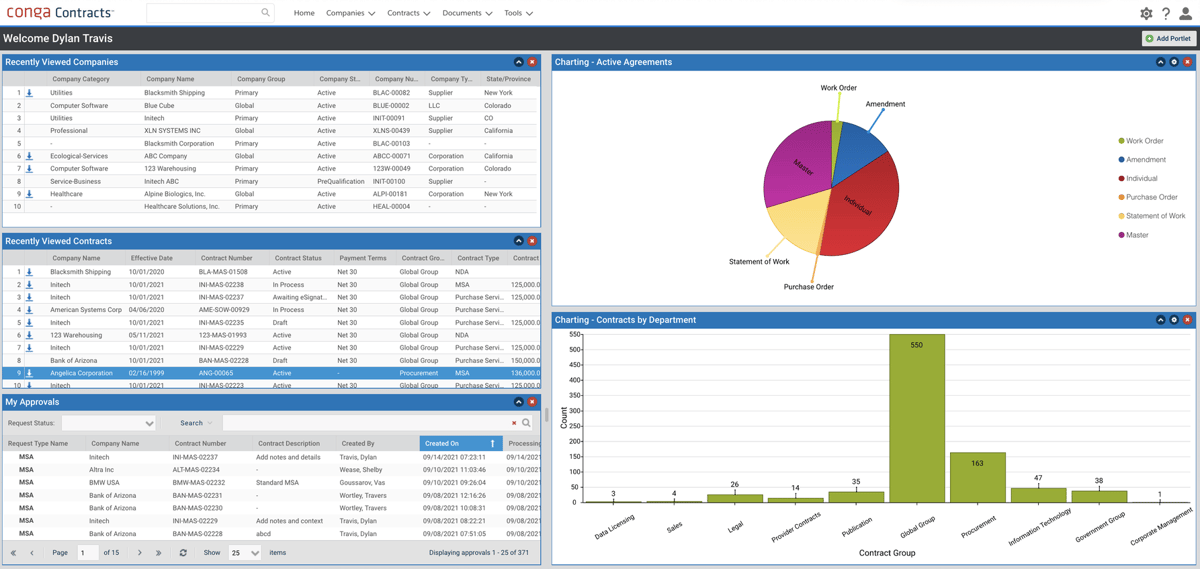
Businesses that use Salesforce and need a CLM solution that integrates seamlessly for automating contract workflows, approvals, and compliance tracking.
Agiloft is a contract management software known for its highly customizable workflows, AI-powered automation, and no-code capabilities.
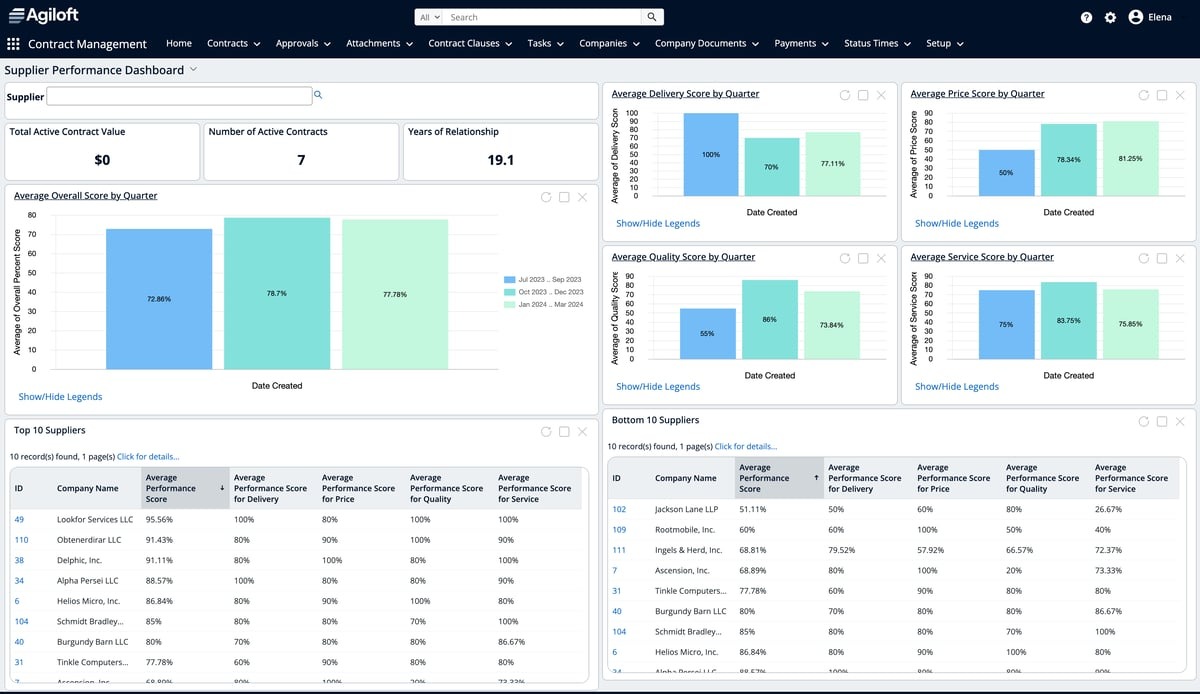
Designed for legal, procurement, and enterprise teams, Agiloft helps businesses automate contract creation, approvals, compliance tracking, and reporting without the need for coding or complex integrations.
Organizations that need a flexible, highly customizable CLM platform with strong AI-powered automation and no-code workflow management.
Managing contracts the old-school way (chasing approvals, sorting through endless email chains, and dealing with last-minute surprises) is a recipe for wasted time and unnecessary costs.
In contrast, a good CLM platform keeps everything organized, speeds up the entire contract process, and helps businesses avoid costly mistakes.
Manually handling contracts eats up hours of work on drafting documents, fixing mistakes, and waiting for approvals. CLM software automates the process, reduces back-and-forth, and keeps things moving, so deals don’t get delayed.
That means fewer bottlenecks, less manual work, and lower costs for both legal and business users.
Missing deadlines or signing off on outdated terms can cause legal trouble or financial losses. A CLM platform tracks important dates, keeps contracts compliant, and sends reminders before things slip through the cracks.
Digging through old emails or messy shared drives to find a contract? Not fun nor productive. Document management tools in CLM software keep everything in one secure place, so teams can search, update, and track contracts instantly without the hassle.
Waiting days or even weeks for a contract to get approved can hold up business deals. A CLM platform automates approvals and integrates with e-signature tools, so contracts get signed and finalized without the usual delays.
Contracts involve multiple people, such as legal, sales, finance, and procurement teams, and managing feedback over email can get messy fast.
Contract management tools let teams collaborate in real time, track changes, and keep workflows moving so nobody gets stuck waiting.
Keeping track of vendor contracts, renewals, and service agreements can be a headache. A CLM system flags upcoming renewals, tracks service terms, and prevents contract lapses, helping businesses maintain good relationships and avoid unexpected disruptions.
CLM software doesn’t just store your contract portfolio. It also analyzes trends, tracks contract performance, and helps businesses negotiate better deals.
With real-time insights, companies can spot risks early and make informed decisions instead of relying on guesswork.
As you can see, CLM platforms offer a wide range of features. Some focus heavily on analytics, while others lean into automation or integrations.
Still, most teams don’t need everything. They need the right core capabilities that make contracts easier to create, review, and manage.
Here’s what typically matters most for a lot of teams:
Choosing the right contract lifecycle management software isn’t just about organizing contracts but also about saving time, reducing legal risks, and making deal-making smoother. The right CLM platform helps businesses cut costs, speed up approvals, and keep compliance in check.
While there are plenty of options out there, Aline stands out for businesses that want an AI-powered, all-in-one solution that simplifies contract drafting, negotiation, and execution.

With AI-assisted contract review, smart approvals, and built-in e-signatures, Aline helps teams get deals done faster without juggling multiple tools.
If you're looking for a modern contract management platform that’s built for speed, efficiency, and accuracy, Aline is the solution.
Get started with Aline today and take the hassle out of the entire contract lifecycle.
The best contract lifecycle management software depends on your business size, workflow complexity, and integration needs, but platforms like Aline, Icertis, and DocuSign CLM consistently stand out. These tools help eliminate inefficient contract management by automating approvals, tracking compliance, and organizing all your contracts in one secure system. With features like AI-assisted drafting, e-signature integration, and real-time collaboration, they turn contracts into valuable corporate assets that support business growth.
Costs vary based on features, users, and integrations. Basic plans may start in the low hundreds per month, while enterprise platforms cost more depending on automation, analytics, and support. Pricing often reflects contract authoring capabilities and how well the system connects with existing enterprise systems. The real comparison should factor in time saved and efficiency gained.
The best option depends on how you plan to use your contract data. Strong platforms offer AI-powered search, structured reporting, and clean repositories that go beyond basic document management platforms. Look for tools that make it easy for internal and external teams to access insights across sales agreements, vendor contracts, and employee contracts.
Microsoft does not offer a dedicated CLM product. Tools like Word and SharePoint support drafting and storage, but they do not provide full lifecycle automation. Many CLM platforms integrate with Microsoft products to combine familiar workflows with structured contract management.

